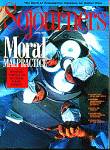The effect was incongruous: the haunting sound of a lone oboe at midnight on Christmas Eve playing "Rudolph the Red-nosed Reindeer." The setting was incongruous as well: Lafayette Park in Washington, D.C., where dozens of homeless people live, just across Pennsylvania Avenue in full view of the White House. The "God bless yous" flowed that night as we shared bread and cookies with the park residents and those vigiling on their behalf from the abundance of the Sojourners Community celebration we had just left.
That same month, December 1991, the U.S. Conference of Mayors released its report on hunger and homelessness in urban America, based on a 28-city survey. According to the report, in 1991 requests for emergency food assistance increased an average of 26 percent, with an estimated 17 percent of requests going unmet; some cities experienced an increase of more than 100 percent. More than two-thirds of those requesting emergency food assistance were families with children. Requests for emergency shelter increased by an average of 13 percent, with 15 percent of the need estimated to have gone unmet.
The statistics bear out what anyone living in urban America--indeed, virtually anywhere in America--already knows. Hunger and homelessness have reached crisis proportions. For most Americans, the lingering images of last Christmas include more than the usual angels and stars. For me, the faces of the desperate remain: the man at the corner of Irving and 11th Streets, washing windshields for change when the light turns red; the one with cup in hand, rocking on a steam grate outside Union Station, singing strains of "Chestnuts roasting on an open fire"; the woman outside a neighborhood restaurant on Christmas Eve, waiting for the leftovers.
The reasons cited for the increasing crisis include unemployment and underemployment, lack of affordable housing, and severe cuts in assistance programs for the poor; in 1991 recession-strapped states made the deepest cuts in programs for the poor in recent history. All of the survey cities expect that requests for emergency food assistance and emergency shelter will increase during 1992.
A MONTH AFTER the mayors released their report, President George Bush released his new budget and delivered the annual State of the Union address. Tax cuts for the rich, some token help for the middle class, and barely a mention of the poor sum up the last week of January. There is little relief in sight for those who will never own a yacht, buy a house, or open an IRA. As one political commentator put it, the poor are "out of fashion" this election year.
Bush was forced to concede to New Hampshire voters in mid-January that the economy is in a "free fall"--but for some the fall is happening more quickly than for others, and there is no safety net to catch them. Bush must find a way to dam the desperation, shift priorities, and create jobs--or his own may be in jeopardy.
Despite his rhetorical flourishes proclaiming America "the undisputed leader of the age"--and the "one sole and pre-eminent power"--those of us with our eyes open can see all too well that the nation is unraveling. The state of the union is desperate. Not surprisingly, no vision of a different future is forthcoming from the White House.
Fortunately, some citizens are working to fill the vacuum. The Citizens Budget Campaign and the National Priorities Project have launched an "Invest in America NOW" campaign, committed to investing military savings into education, health care, low-cost housing, environmental programs, and job training. Similarly, the non-partisan Campaign for New Priorities is calling for a shift in resources from military spending to domestic programs. And Jobs With Peace is launching a "1992 Voter's Pledge Campaign on National Priorities." With the end of the Cold War, and an election year that turns the heat up on political leaders, the time is right to demand a change in the nation's priorities.
Bush stated in his State of the Union address that in the past year the world has seen "changes of almost biblical proportions." But what is truly needed is a change to biblical priorities. In the Bible, God's harshest judgments are reserved for the nations that turn their back on the neediest. Unless we change, the faces of the poor will continue to haunt us, like the strains of an oboe across Pennsylvania Avenue--and the images of last year will follow us through 1992.
Joyce Hollyday was associate editor of Sojourners when this article appeared.

Got something to say about what you're reading? We value your feedback!
